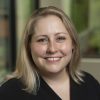On July 1, 2021, Dr. Linda Z. Carling, EdD will assume the role of Director for the Johns Hopkins (JHU) School of Education (SOE) Center for Technology in Education (CTE). Her vision for the center honors that of her predecessor, Dr. Jacqueline Nunn, who will be stepping down after 30 years of service in August.
“As a Center, our vision is to change lives through knowledge that matters, and to ensure that education is inclusive and accessible for all learners,” Carling said. “I feel privileged to have the opportunity to lead this group of passionate and talented people at CTE who all believe deeply in the importance of our work.”
Laying the foundation
Carling received her Masters of Science in Technology for Educators and an EdD in Teacher Development and Leadership from JHU after teaching fourth grade in Montgomery County, Maryland and working for eSylvan building the online math curriculum that is still used across the country today. She has taught courses in online teaching and learning, and instructional strategies for online learning as an adjunct instructor at SOE since 2007.
“My entire education and career has been focused around figuring out how to help students who learn online engage and feel like they’re part of the community,” Carling said, which led her to embark on her nearly 20-year career with CTE in 2001 as a consultant hired to write the model for online learning, both for the center and the school. She was then hired full time as a project manager and instructional designer and began to build the first online graduate program at SOE.
In 2009, Carling became program director for teaching and learning. During her time at the center, she has built many continuing education programs for CTE that leverage technology for learning, helped to build the school’s first online graduate programs, built an additional graduate certificate with the school around teaching and learning online, trained teachers who work in correctional facilities throughout the state using technology, and built the professional development for the Early Childhood Comprehensive Assessment System — online tools to measure and improve outcomes for young children.
She has forged several long-standing relationships with major local and national partners such as the Maryland State Department of Education, the Ohio Department of Education, the International Society for Technology in Education, and The DaSy Center.
One of her notable accomplishments — building a professional development tool for early learning assessment used by tens of thousands of educators who work with young children receiving special education services in three states — represents the meeting of her professional and personal motivations, as Carling’s young son has autism.
“I’ve always been passionate about what we do as a center, but having an autistic son takes it to another level,” she explained. “I see the impact we have in a deeper way; I feel it, I live it, and I get it. I bring both the perspective of an educator and a parent, and being on both sides of the challenges students with disabilities face informs my work.”
Building a future
“Linda is one of the most capable and optimistic educators I have ever met,” said School of Education Dean Christopher C. Morphew. “She brings to this role an innovative organizational mindset and deep experience in learning engagement at a crucial time for the school and for the field of education.”
Carling’s 20-year ascent from consultant to director has given her an invaluable and intimate knowledge of the center’s potential; she is well-versed in both the needs of her team and of those the center serves.
Some of her plans include growing its research and evaluation initiatives which will allow the center to understand and communicate its impact and expertise; reviewing the organizational structure in order to ensure that all staff have the opportunity to leverage their passions and build on their strengths; and finding new opportunities and partnerships that will help grow the center’s community and expand its impact as they move forward.
Carling and her colleagues have been working on the center’s strategic plan, and honing its mission. One crucial part of this work has been to develop the center’s values: solidarity, ingenuity, fidelity, and community.
“We took a hard look at who we are, what we believe in, and what our priorities are both as a team and as an organization,” Carling said. “Our values reflect both how we operate as a community internally, and how we support the communities we serve. It’s so important to walk the walk and to work together toward all of our goals, and under this united intention we plan to move the center forward into the future.”

